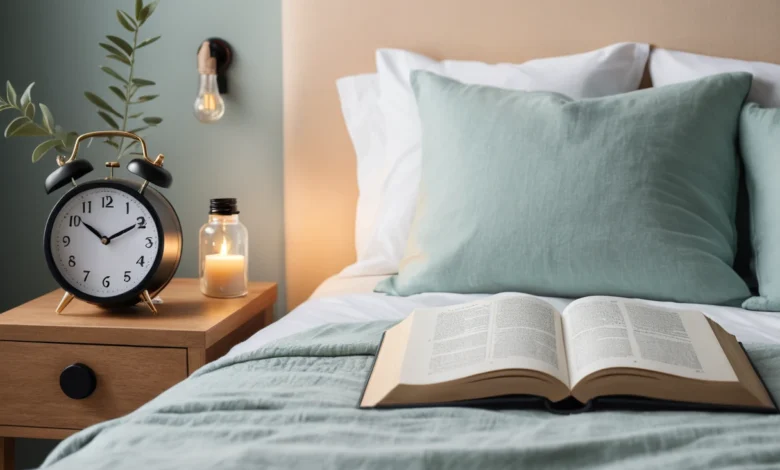Daily Hacks for Improving Sleep Quality

In today’s fast-paced world, getting a good night’s sleep can often feel like an elusive goal. Many people struggle with sleep issues, leading to fatigue, decreased productivity, and overall poor health. Fortunately, improving your sleep quality doesn’t require drastic changes. With a few simple daily hacks, you can enhance your sleep and wake up feeling refreshed and revitalized. This guide will share practical tips to help you sleep better every night.
1. Establish a Consistent Sleep Schedule
One of the most effective ways to improve your sleep quality is to maintain a consistent sleep schedule. Go to bed and wake up at the same time every day, even on weekends. This routine helps regulate your body’s internal clock, making it easier to fall asleep and wake up naturally. Over time, this consistency will lead to better sleep quality.
2. Create a Relaxing Bedtime Routine
A calming bedtime routine signals your body that it’s time to wind down. Spend the last hour before bed engaging in relaxing activities such as reading, meditating, or taking a warm bath. Avoid stimulating activities like watching TV or scrolling through your phone, as blue light can interfere with melatonin production, making it harder to fall asleep.
3. Optimize Your Sleep Environment
Your bedroom should be conducive to sleep. Keep your sleeping environment dark, quiet, and cool. Invest in blackout curtains to block out light and consider using white noise machines or earplugs to minimize disruptive sounds. Additionally, ensure your mattress and pillows are comfortable and supportive, as this can greatly impact your sleep quality.
4. Limit Caffeine and Nicotine Intake
Caffeine and nicotine are stimulants that can significantly affect your ability to fall asleep. Avoid consuming caffeine in the afternoon and evening, as its effects can linger for hours. Similarly, if you smoke, try to refrain from using nicotine close to bedtime. Instead, opt for herbal teas or calming beverages to help relax your mind and body.
5. Be Mindful of Your Diet
What you eat can influence your sleep quality. Avoid heavy or large meals close to bedtime, as they can cause discomfort and indigestion. Instead, opt for light snacks if you’re hungry. Foods rich in tryptophan, such as turkey, nuts, and dairy, can promote sleepiness. Additionally, magnesium-rich foods like spinach and bananas can help relax your muscles and promote better sleep.
6. Incorporate Regular Exercise
Regular physical activity can improve sleep quality and help you fall asleep faster. Aim for at least 30 minutes of moderate exercise most days of the week. However, try to avoid vigorous workouts close to bedtime, as they can have the opposite effect. Instead, consider incorporating calming exercises like yoga or stretching in the evening to promote relaxation.
7. Limit Screen Time Before Bed
The blue light emitted by screens can disrupt your body’s natural sleep-wake cycle. To improve your sleep quality, limit screen time at least one hour before bed. If you must use your devices, consider enabling a blue light filter or using blue light-blocking glasses to minimize its impact on your sleep.
8. Manage Stress and Anxiety
High levels of stress and anxiety can hinder your ability to relax and fall asleep. Incorporate daily stress management techniques such as deep breathing, meditation, or journaling. Take a few minutes each day to unwind and process your thoughts. This practice can help you enter a calmer state of mind, making it easier to drift off to sleep.
9. Consider a Sleep Diary
Keeping a sleep diary can help you identify patterns and factors affecting your sleep quality. Track your sleep duration, quality, bedtime routines, and lifestyle habits such as diet and exercise. Reviewing this information can provide valuable insights and help you make necessary adjustments to improve your sleep.
10. Limit Naps
While napping can be beneficial, excessive daytime sleep can negatively affect your nighttime sleep quality. If you find yourself needing a nap, limit it to 20-30 minutes and avoid napping late in the day. This approach helps prevent disruptions to your sleep schedule, allowing you to enjoy a deeper and more restful night’s sleep.
Conclusion
Improving your sleep quality is achievable with simple daily hacks that promote relaxation and establish healthy habits. By implementing these strategies—such as maintaining a consistent sleep schedule, creating a calming bedtime routine, and optimizing your sleep environment—you can transform your sleep experience. Prioritize your sleep as an essential aspect of your overall well-being, and watch as your energy levels and productivity soar.





